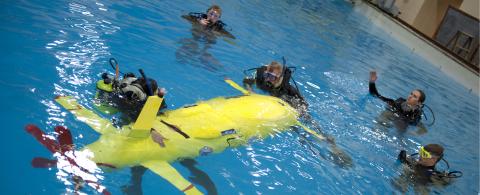Every month, we highlight an outstanding example of UNH intellectual property with excellent commercial potential. Contact unh.innovation@unh.edu for more information about any of UNH's innovations.

Pose Detection and Control of Unmanned Underwater Vehicles (UUVs) Utilizing An Optical Detector Array
Unmanned underwater vehicles (UUVs) play a major role in deep oceanic applications, such as underwater pipeline and cable inspection, underwater terrain mapping, as well as in military applications such as mine detection, harbor monitoring, and anti-submarine warfare. These applications mostly take place in deep sea environments and include heavy duty tasks that may take long time periods and are therefore not suitable to be performed by divers. Some underwater operations (e.g., surveying a large area or an area with a complex seafloor topography) require more than one UUV for efficient task completion. In these cases, the deployment of multiple UUVs in formation can perform such tasks and reduce the operational time and costs.
A requirement for a group of UUVs to move in a controlled formation is an underwater communication link between the UUVs. In addition to UUV operation in formation, underwater communication links can also be used for UUV docking or data transfer from an operating UUV to a data storage platform, which allow UUVs to operate for longer stretches of time underwater without the need for excessive emerging/submerging.
This innovation provides for the design of optical detectors and methods of optical detection for UUVs. The detectors can be used in multiple degrees of freedom to dynamically position a team of UUVs to produce coordinated motion. This type of coordination is typically achieved using acoustic sensors. Using cost-efficient optical sensors can reduce the cost of operating and manufacturing UUV systems, thereby reducing overall mission costs. Because of this research, UUV systems could be more widely accessible and could be used more often and more effectively to perform dangerous underwater operations without risk to human divers.
Archive
-
2021
- September 2021
Betty and Barney Hill Collection
- MARCH 2021
Innovations in Aqueous Electrochemical Energy Storage Devices
-
2020
- MARCH 2020Viscoelastic Liquid Drop Generator
- February 2020IOL INTACT® Protocol Testing Software
- JANUARY 2020SIMAP®
-
2019
- AUGUST 2019
- JULY 2019
- JUNE 2019
- APRIL 2019
- MARCH 2019
- JANUARY 2019
-
2018
- DECEMBER 2018
- OCTOBER 2018
- SEPTEMBER 2018
- JULY 2018
- JUNE 2018